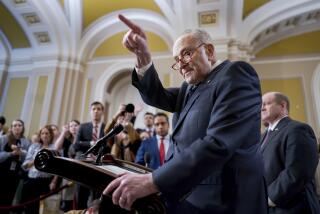Senate Sides Agree on ‘Fast-Track’ Trade
- Share via
WASHINGTON — Democratic and Republican negotiators announced Thursday that they had cleared obstacles to Senate passage of a bill granting President Bush greater authority to negotiate international trade agreements.
Central to the agreement is a package of expanded benefits, including a 70% federal health insurance subsidy, for qualified workers who lose jobs in domestic industries hurt by foreign competition.
Republicans also agreed to roughly double the number of workers eligible for the program known as “trade adjustment assistance.” Overall, the worker aid provisions would cost $10 billion to $12 billion over 10 years.
In exchange for those GOP concessions, Democratic negotiators agreed to drop demands for a costly federal subsidy of retirement benefits for steelworkers and certain restrictions on Mexican trucking in the United States.
The accord was reached by Sens. Max Baucus (D-Mont.), Charles E. Grassley (R-Iowa), Phil Gramm (R-Texas) and John B. Breaux (D-La.), and had the blessing of the Senate majority and minority leaders. Senators also said the White House was pleased with the progress.
“We have an agreement,” Baucus told reporters. He called the worker assistance provisions “a huge improvement over current law.”
The agreement means that the Senate is likely to move within a week on a major priority for the Bush administration and the business community: a bill granting the president “trade promotion authority.”
That authority, also known as “fast-track,” would permit Bush to negotiate trade deals subject to congressional approval on an up-or-down vote with no amendments.
The Senate will package the worker assistance deal with the trade promotion bill and a third bill to promote open trade with Colombia, Peru, Bolivia and Ecuador.
The trade debate in the Senate has been stalled since the House narrowly approved its own version of trade promotion authority in December. After Senate passage, which now seems almost certain, the two chambers will have to reconcile their differences and vote one more time before a bill can be sent to Bush.
Most labor unions and environmental groups oppose the trade legislation, arguing that it fails to protect workers’ rights and weakens environmental protections worldwide.
But Republicans praised Thursday’s breakthrough, which would give Bush an authority held by every president since Gerald R. Ford in 1974. The authority lapsed in 1994, however, and then-President Clinton tried to regain it.
More to Read
Sign up for Essential California
The most important California stories and recommendations in your inbox every morning.
You may occasionally receive promotional content from the Los Angeles Times.









